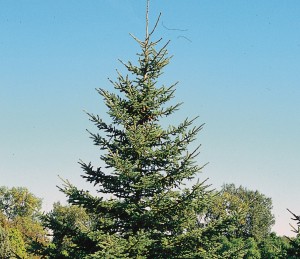Tree planting campaign begins on Illinois state fairgrounds
Chronicle Media — November 12, 2015
The 2015 shipment of replacement trees from the Illinois Green Industry Association will include 25 evergreen trees, including Black Hills spruce.
In a move that will forever change the landscape of the Illinois State Fairgrounds, the Illinois Department of Agriculture is partnering with Illinois Green Industry Association to replace dozens of trees removed due to an invasive pest known as the Emerald Ash Borer.
In June 2015, staff members with the Illinois Department of Agriculture Bureau of Environmental Programs identified 73 trees on the fairgrounds impacted by the bug. Due to an increase in the number of visitors on the fairgrounds, 41 trees were removed for safety reasons prior to the start of the State Fair in August. Internal tree removal work has been on-going throughout the year.
“Research shows trees improve overall quality of life,” said Gov. Bruce Rauner. “The state fairgrounds should be a showcase for what can be done in public spaces to promote the state’s forestry resources.”
With this new partnership, IGIA will donate 50 trees a year to the Illinois Department of Agriculture until the year 2019. IDOA and IGIA worked together to select a diverse variety of trees, as well as find a suitable planting location on the fairgrounds that is free of underground utilities. IDOA staff will plant and develop a care plan that will enhance the potential for long-term tree survival.
“I have had the privilege of having an office on the state fairgrounds for the last 35 years,” said Acting Agriculture Director Warren Goetsch. “I have seen the number of trees continue to dwindle and this is a great opportunity to improve the grounds. We are extremely grateful for the work of the Illinois Green Industry Association and this gracious gift that will have a lasting impact on the landscape of the Illinois State Fairgrounds.”
The 2015 shipment of replacement trees from the Illinois Green Industry Association will include 25 evergreen trees, including Black Hills spruce, Norway spruce, Serbian spruce, and Canaan Fir trees. Also included in the 2015 trees are 25 various deciduous trees: Sugar Maple, Midget Crab low branched, Thornless Cockspur low branched, Kentucky Coffee, Donald Wyman Crab, Triumph Elm, and Skyline Locust trees.
“Members of the IGIA are good stewards of the land and of our most valuable natural resources. They also are good stewards of their local communities,” said Joe Khayyat, executive director of Illinois Green Industry Association. “The IGIA has long been involved in and active on the Illinois State Fairgrounds; we are proud to be a part of the State Fair family and community.”
The tree planting campaign will also bring a new Lincoln connection to the state fairgrounds. Seedlings from an oak tree planted in Washington, Ill. by a friend of Abraham Lincoln have been grown with the intent of replanting throughout the state. The original oak tree, planted in Lincoln’s honor, was re-discovered by IDNR staff members during a post tornado tree inventory in Washington. The original tree was not destroyed by the tornado, but is in a state of decline. In order to preserve this historic connection, IDNR staffers collected acorns to grow the seedlings.
These new trees are being planted as part of IDNR’s Tornado Re-Leaf efforts and other special projects. One of those special projects includes a tree planting on the state fairgrounds. On Thursday, Governor Rauner was on hand to assist IDOA staff in planting the historic tree in its new home just north of the Lincoln statue inside the main gate of the fairgrounds.
Since the first detection of the Emerald Ash Borer near Detroit, Michigan in 2002, the beetle has killed more than 250 million ash trees nationwide. The borer, known for its distinctive, metallic green wing color, is native to Asia. Its larvae burrow into the bark of ash trees, causing the trees to starve and eventually die. The tiny beetle often is difficult to detect, especially in newly infested trees. Signs of infestation include thinning and yellowing of leaves, D-shaped holes in bark of trunk or branches and basal shoots.
In October 2015 IDOA dropped its internal quarantine of ash products, as the invasive pest has been detected in half of all counties in the state of Illinois. A federal quarantine remains in effect meaning firewood, or other ash related products, cannot travel into a state that currently has EAB regulations.
— Tree planting campaign begins on Illinois state fairgrounds —







